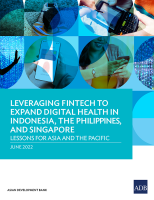
Indonesia is turning the COVID-19 pandemic crisis into an opportunity for health sector transformation that promises accelerated improvement in health performance and enhanced health resilience. Photo credit: ADB.
The Ministry of Health is rolling out reforms to improve primary and referral care, address the shortage of medical specialists, and widen access for remote communities.
It was the worst of times when Budi Gunadi Sadikin took office as Indonesia’s Minister of Health in December 2020 with his country and the rest of the world in the midst of grappling with the COVID-19 pandemic. But it was also the best of times for the country’s highest health official to phase in much-needed reforms for the sector.
A former banker, who lived through two global financial crises, Minister Budi knew early on the pandemic presented a golden opportunity to reform the health sector. After all, Indonesia’s banking industry emerged from the 1997–1998 and the 2007–2008 financial crises much stronger exactly because of reforms instituted during the downturns, especially the one in 1997–1998.
During a recent talk at the Asian Development Bank (ADB), Budi said Indonesia President Joko Widodo gave him explicit instructions to lean on his experience during the financial downturns to manage the COVID-19 crisis and to use the pandemic as an opportunity to initiate health reforms.
Health system challenges
While Indonesia’s health status has improved steadily since 2000, the pandemic resulted in a reversal of hard-won gains in key health indicators. Indonesia’s life expectancy, maternal mortality ratio, and under-5 mortality rate lag Viet Nam, which has a similar gross national income per capita, and more prosperous countries in Southeast Asia such as Thailand and Malaysia. Indonesia is experiencing rapid demographic, epidemiological, and climate changes that evolved healthcare needs, To achieve the Sustainable Development Goals (SDGs) for health by 2030, Indonesia needs to accelerate health improvements by investing in priority programs and further strengthening the health system.
The COVID-19 pandemic highlighted the limitations in Indonesia’s healthcare system, including primary care and laboratory services. Indonesia needs to address the shortage of doctors, particularly specialists. According to the Ministry of Health, Indonesia has a shortage of 30,000 medical specialists. It also needs to improve the quality of healthcare and accessibility for remote communities.
Given the magnitude of the reforms needed, as soon as Indonesia controlled the spread of the virus, Budi set out to transform the sector. The Ministry of Health (MOH) put forth the Health System Transformation Agenda (HSTA) that is built on six transformation pillars: (i) primary health care; (ii) referral care; (iii) health resilience; (iv) health financing; (v) health talents; and (vi) health technology. In July last year, Indonesia passed the Omnibus Health Law, which solidified HSTA and contained provisions to expand quality health coverage and build health resilience for all. In an opinion piece for Nikkei Asia, the minister said that reforming Indonesia’s health sector is “the last mile” to becoming a prosperous high-income industrialized nation by 2045.
Indeed, Budi's banking background proved useful. ADB Senior Health Specialist Ye Xu credited the minister’s 30-year stint in finance for helping advance the reforms. “As a banker, Minister Budi understands finance and therefore he was able to leverage greater financial resources outside of the MOH budget to implement the critical reforms that are needed to enhance health system capacity.”
Focusing on primary healthcare
Key to financing the reforms is a $4-billion syndicated loan, which kicked in in December last year, just 5 months after the bill was passed. The loan will upgrade and enhance primary health care facilities and public health laboratories nationwide.
The loan had “very favorable terms and interest for the Republic of Indonesia,” said Budi.
The project will equip more than 10,000 primary health care facilities and more than 500 public health laboratories nationwide to fully meet the minimum service standards stipulated by the government. The support will include equipment procurement, delivery, commissioning, user training, operations and maintenance services, and capacity development in operations and maintenance services.
The Asian Development Bank (ADB) cofinanced the loan with the Asian Infrastructure Investment Bank, the Islamic Development Bank, and the World Bank.
ADB approved its share of the loan amounting to $650 million in December 2023. “This landmark project… will address the critical gaps and disparities in service readiness of primary health care facilities, public health laboratories and referral hospitals in the country toward universal access to quality health services and improved health system resilience and robustness,” said ADB Human and Social Development Director Karin Schelzig in a news release.
“The investment will be a cornerstone in standardizing primary health care services and reducing disparities in access to standardized services, particularly for the poor, rural, and remote locations,” added ADB Country Director for Indonesia Jiro Tominaga.
The support is on top of the $350-million ADB results-based lending program approved in November 2023 to strengthen, integrate, and standardize the life-cycle primary care delivery model in puskesmas (primary public health center) and posyandu integrated service posts) across the country. The program also promotes the integration of health information systems in primary care facilities with the health ministry’s digital health platform (SATUSEHAT) and supports the SDGs, particularly Goal 3 (good health and well-being), and Goal 5 (gender equality).
Both loans will also support Indonesia in fighting future pandemics, said Xu. The $350-million loan program includes investments to strengthen surveillance of infectious diseases of importance at the primary care level public health laboratories, so that new pathogens can be identified and reported earlier. The $650-million investment project supports public health laboratory network to enhance pandemic preparedness and response, so Indonesia could act more swiftly and cope effectively when the next pandemic hits.
Alongside the reforms, Budi created a cultural change at the Ministry of Health, said Xu. He introduced external talents to lead policy research, digital transformation, and program design, ensuring MOH is guided by the best evidence, she said. “Minister Budi doesn’t believe in traditional bureaucracy, but MOH is a long-standing and large bureaucracy. To create a culture for results and speed, he leveraged external financial and human resources to nudge for improved performance for MOH staff.”
In his talk at ADB, Budi noted the importance of securing buy-in from key stakeholders for the country’s biggest ever health reform and stressed the need for a sustainable business model for the healthcare system. He cited Japan, the Republic of Korea, and Singapore for being able to keep per capita health spending down while being among countries with the longest life expectancy by focusing on primary instead of secondary care, and on promotive and preventive care instead of curative. All three countries have kept per capita health spending under $5,000 as of 2020 compared with countries like the United States, which spends about $11,700 per capita. “It is very important that we focus on promoting healthy lives and well-being,” said Budi. “The best wealth is health.”

